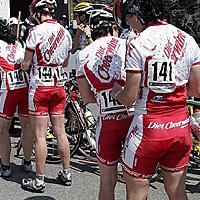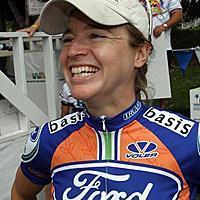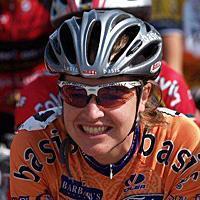
Recently on Cyclingnews.com |
Tales from the peloton, October 11, 2005
Altruism in women's cycling
Making things happen in the US women's racing scene
Obtaining sponsorship dollars to support cycling in the US has many challenges. While Lance Armstrong has raised awareness of the sport over the past decade, the domestic side of team support has remained a tough business, particularly for women's cycling. Cyclingnews' North American Editor Mark Zalewski takes a look at how the sisters are doing it for themselves.

|
Saturn was a strong women's programme for many years, but received a lot of that support due to the men's side of the team. In recent years the T-Mobile squad has been at the top of US women's cycling, both in terms of rankings and sponsorship money, but even that team has its share of money woes Within this climate, trying to start and maintain a team is an exercise in number crunching, budget restraint and learning how to ask for more money. However, there are people out there who want to help make a difference, from opening their wallets to opening their homes. Two examples of this altruistic cycling support come from the Diet Cheerwine and Ford-Basis teams.
The Diet Cheerwine team comes from North Carolina where the soft drink company is based. It was started single-handedly by Anne Bolyea, a former skier that got into cycling after injuring her knee. "I got on the bicycle in 2001 after I had ACL surgery - it was more for rehab purposes," she explains. I used to be a ski patrol, but I enjoyed it so much I started racing cross and absolutely fell in love with it. Then I started on the road here in Boone, North Carolina with a local club team."
Things progressed even more rapidly for Bolyea the following season when she decided to use personal funds to start a women's professional team of her own, naming her family's beverage company as the title sponsor. "In 2002 I started the team with a very small budget to see the interest I would have from the women here in the southeast. It just escalated from there! Last year we took some girls to Altoona and ended up around 59th on the NRC rankings." With interest still growing from women racers, Bolyea invested more of her time and money into the programme, culminating this season with a team that broke into the top 10 on the NRC rankings. "In 2005 I decided to put in a significant amount of money - Tara Ross helped me get in contact with some outstanding racers in Leigh Hobson and Laura Yoisten, and we became a top ten team!"

|
"I saw the huge need for support in women's cycling," Bolyea explains. "It's limited and frustrating. I've played so many sports in my life and cycling is the hardest - both physically and mentally. And I don't think people are aware of that outside the cycling world. There is so much talent out there and so few places for that talent to go. So I decided to do something about it. The Ford-Basis team is another example and Nicole has done such a good job. She is so savvy and great at budgeting. I really admire her for what she does."
Nicole Freedman's Ford-Basis team is another example of altruism in cycling. Her team operates on an extremely tight budget and relies on support from a variety of sources. "While running the Ford-Basis team I often feel like I have an army supporting me emotionally, physically and financially," says Freedman. One of those 'soldiers' supporting Freedman's team came in the form of the Tenace family of Minnesota. Like many people across the country, the Tenace's opened their home to the team while they raced at the Nature Valley Grand Prix. According to Freedman, this was their first experience with cycling and the family was soon hooked.
Not long after Nature Valley, Gino and his wife Robin Tenace joined Larry Gies and Ross Pearlman as financial donors to the Ford-Basis team. "My daughter is important to me, and it's important that she have good role models - I can't think of anyone better than your team to fill that role," Gino Tenace told Freedman in relation to his decision to make a cash donation to the team. "Your team is made up of good people. You were good to us, good to our family, and genuinely nice people."
That particular donation allowed the team to actually hire a manager/mechanic so that the team could focus more on racing. "The team was much more successful this year. We have been following this season and seeing all of the successes. Having Eric [Ford-Basis mechanic] on the team made everybody more relaxed and gave everybody a chance to focus on their racing," said Tenace of the difference the extra money made.

|
Another generous donor, Ross Pearlman of Arizona, came to cycling after he nearly died of an asthma attack. "I owe my life to cycling," said Pearlman. "Without it I don't think I would be around due to my asthma. I hope to be an inspiration to others like [the team] is an inspiration to me - I honestly admire and respect everything [the team] does." The team has earmarked Pearlman's donation towards developing racers for the 2008 Olympics.
As for the Diet Cheerwine program, Bolyea has joined forces with Mike Tamayo and his Victory Brewing team for 2006. "I probably could have used the budget better and that is why I am getting together with Mike - he knows a lot about women's cycling, so it will be a great match," says Bolyea. "Anne used to race and just enjoys cycling," says Mike Tamayo. "She is in a position where she can give back to women's cycling, and has done that with the Diet Cheerwine team. She's a philanthropist and wants to help women's cycling."
The two programmes will merge for next season, with the Victory Brewing team as the professional squad and the Diet Cheerwine programme remaining amateur in order to develop new talent. "Obviously I am putting the majority of the funds into the Victory Brewing team to have a shot at becoming the number one team next year. But the Diet Cheerwine team is going to be surprisingly good as well, and we'll go to about 13 NRC races next year. This will allow the good racers from the team who can't commit to racing full-time an opportunity to race."
In the end, Bolyea hopes that her actions will inspire more people and companies to take up the cause of women's cycling, in whatever form they can. "I'm hoping that larger companies will see that if I could support a team on my own for three years then they could support a team with no problems!"
